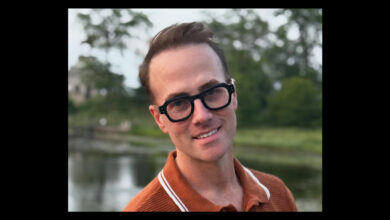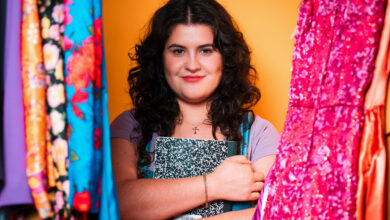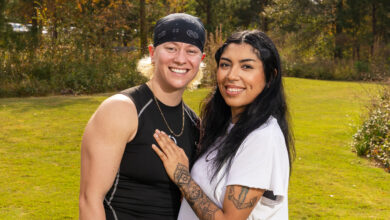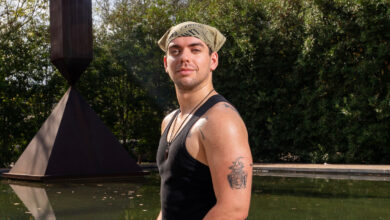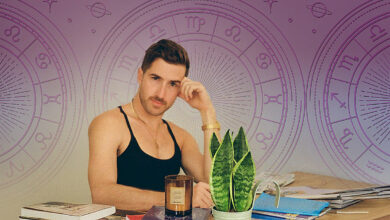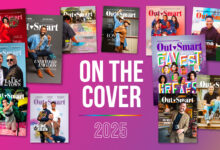
Foot to the Pedal
![“The idea that a man who has sex with both men and women should have to deal with being told that he’s simply gay is just as wrong as [someone telling a] gay person that he is committing some kind of error . . .”](http://outsmartmagazine.com/wp-content/uploads/2013/04/CameronOnOrgan.jpg)
by Blase DiStefano
Photo by Heiko Laschitzki
Forget everything you know about the organ and its players. Organist Cameron Carpenter is part of a new breed of dynamic young performers—“stodgy” does not apply here. Carpenter’s unorthodox approach to the organ is unique—and his radical outlook also seeps into his views on marriage and even sexuality. He’s a twenty-first-century kind of guy.
Carpenter was in Houston about five years ago when he played at First United Methodist Church. This month he performs at Christ Church Cathedral for the Society for the Performing Arts.
I talked to Carpenter while he was walking the streets of Berlin, where he has lived for the past three years. Phone reception had been clear until the end of the interview when we were discussing marriage. As luck would have it, I got just enough.
Is he gay? Yes and no. Does he believe in gay marriage? Yes and no. And what is this concept of a digital organ? Read on.
Blase DiStefano: The first thing I’d like to ask: to those people who are reading this and are thinking, God, I’m not interested—he’s playing the organ, what do you have to say?
Cameron Carpenter: What I have to say is [that people shouldn’t go to hear the instrument, but rather] to hear the performer. That’s a pretty contentious idea amongst organists.
The fact is that the organ is the most dynamic, potentially expressive instrument that the mind of man has ever created. The fact that it is the most underutilized and stereotyped instrument is for me a kind of a paradox, which might have something to do with the actual terror and ferocity of actually [dealing with] how powerful the medium actually is. It takes an incredibly strong and pronounced personality to be able to cope with this force.
Especially the way you play. I saw some of your videos online, and it seemed your feet were moving more than your hands at times. It was amazing.
Thank you. I appreciate that. One of my challenges to myself is that I develop my entire body as an instrument, because I was also a dancer. It’s very important to me—and one of my continuing challenges, something which I obviously don’t feel I’ve reached yet—to be able to play with the same accuracy and expressivity and speed with my feet as I’m able to do with my hands. So my life is very devoted to expanding the language of the organ and developing my own sound. One hears singers, particularly jazz singers, and popular musicians talking about developing their own sound. Even violinists are thought to sometimes have their own sound, and certainly this is a highly prized notion among pianists. But it’s an unheard of thing amongst organists. And to me, that’s shocking and wildly inappropriate thinking.
Where were you born?
I’m from northwestern Pennsylvania.
So had you lived in the States until you moved to Berlin a few years ago?
Yes. I was homeschooled and lived in Pennsylvania until the age of eleven. Then I joined the American Boychoir School in Princeton, New Jersey. After that, I went to the University of North Carolina for high school, and then to Juilliard.
So yes, until I graduated with my second master’s degree from Julliard, I was living in the United States.
I read that you basically consider yourself “queer,” as opposed to gay or bisexual. Is everybody “queer”?
I have no great statement to make about human sexuality in general. If I can cite a friend of mine who is a German psychiatrist—he once suggested that everyone should leave their sexuality locked somewhere in a box, which I find a very interesting concept, not in the sense that one should ignore one’s sexuality, or by any means repress it, but that any attempt to define it is effectively a vanity. I guess I would agree with that, at least in my case. I would never make the statement that everyone is queer, because I think that when we say everyone is anything, we’re dangerously close to exercising a belief in human homogeneity, which I think is something which has led to the worst displays of character in history. Speaking as a person who lives in the former center of the Third Reich, I can tell you that’s a pretty serious matter.
But on the other hand, I do think our definitions of sexuality are pretty banal. And whatever may be said about them—certainly not very interesting conversationally, so I find—the problem with definition and language is that you ultimately have to come down on the side of a definition or a description. Probably one of the reasons I like the organ is because it defies description, at least in my thinking of it. So I use the word queer, but someday there may be a better word. I think the better situation would be that maybe someday we simply won’t need a word.
I hope to be alive when that day comes. When I asked if you think everybody is queer, I meant those of us in the “gay” community, and what all of that entails.
[As] somebody in my position who is an outsider on many fronts, I tend not to invest heavily in protecting the gay community’s ideas of itself, simply by virtue of the fact that the gay community is notoriously intolerant of, for instance, trans people, or the acceptance of male bisexuality in particular. There are other unfortunate biases there—which are by no means widespread—that have to be overturned.
For instance, the idea that a man who has sex with both men and women should have to deal with being told that he’s really simply gay is just as wrong as [someone telling a] totally gay person that he is committing some kind of error or, even worse, is afflicted by some dread psychological disease and should undergo therapy.
I guess the answer to the question is, the thing that sort of irritates me is not the issue or the definition, but the scarcity of true intellectual inquiry within the community. Obviously, we have queer scholarship, which is a different thing, but the idea that [the average LGBT person] doesn’t take the time to think about these things is something that I think should change.
Were you brought up in a, for lack of a better word, liberal household? How did you come about thinking the way you do? Did your parents help in any way?
Well, my parents were better than textbook examples of how one might hope to raise a child in the sense of making everything possible available, even though I come from essentially a non-musical family. I was exposed in a very non-judgmental way to a great variety of things, all before the age of eleven. By the age of eleven, I had already performed Bach’s The Well-Tempered Clavier. Naturally, I had an earlier start in life on a lot of things that were later to shape me intensely. But I would hesitate to describe them as liberal. My father was a member of the National Rifle Association and a far-right voting Republican. I would say I came from a family which was quite politically mixed.
The word you had used was non-judgmental. I think that’s probably the most important thing.
I think so, too, because I am old enough to remember those long-past days when one could call one’s self a Republican and still have Democrats as friends. And those days still exist in Europe, although Europe is so heavily mired—or some would say “elevated”—in socialism and socialistic undertaking, but it’s somewhat different. One has a sense that there’s less at stake in the holding of certain traditions.
Certainly almost everyone, I think, agrees that we have lost true democratic exchange and inquiry in the United States. That may be directly relatable in some microcosmic way to the issues of inquiry that I was just talking about.
Back to the organ. Did you design your own organ?
I am an organ designer, and I am the world’s leading proponent of the digital organ. The digital organ is sort of regarded as the black sheep of the organ world, [where the ideal is considered to be] the pipe organ. I’ll be playing a pipe organ in Houston—and quite a notable one, which I look forward to.
But to answer your question, there are four organs in the world which are intensely groundbreaking and extremely noteworthy instruments, which I believe will occupy—one of them already does—a significant place in the development of musical instruments in general, specifically electronic music. They are all built by the Marshall & Ogletree organ company that I’ve worked with as a designer.
Where are they located?
Three of them are in the New York City area. One of the most famous organs of the last ten years is the organ at the Trinity Church-Wall Street in New York, where my first recording Revolutionary was made. Then there’s a smaller instrument at a church in the East Village, which I designed. Its sister organ is at a Catholic university in Florida, and the fourth organ is in Montclair, New Jersey.
I definitely believe the organist should have an engineering relationship with his instrument whenever possible.
Isn’t your “dream organ” being built now?
Yes. It will be unveiled in the spring of 2014. [Details are still confidential.]
But, basically the vision that I’ve been working on for almost ten years is finally going to come to pass, which is that I will have what I believe will probably be the first truly artistic digital organ in the world. It will be specifically contrived not to live in any single place, but to travel everywhere. It will give me the ability not only to play everywhere in the world, but to be able to play an ultimate instrument that I actually designed and that will be able to accommodate my style, musical beliefs, goals, and leanings, and which will make a commercial future for organists vastly more expansive, compared to what’s possible now.
Would “expensive” also be the right word?
Yes, [this new organ project] is something with a pretty heroic cost.
Congratulations. Also, do you design your own clothes?
I do. I don’t get to do as much as I would like right now because I have so many other things that take my time, but I’ll probably be wearing a couple of things I’ve designed in Houston.
And your shoes?
I design my own shoes as well.
I read that the shoes have to be big enough to hit two pedals at once.
It depends on the interval in question and the musical context, but basically I’m able to play two notes with each foot, and sometimes more, depending on the structure of the chord.
What do you think of marriage—not necessarily gay marriage, but marriage in general?
I find marriage to be kitschy, rather adorable. A cute idea. It’s adorable in a charming, totally anachronistic way. I find the idea of marriage, gay or straight, is totally ludicrous as a practice worth fighting about. However, it is a human right, however silly we or I may think it is, which I certainly do. What’s incontestable is that a right extended to person A must have to be extended legally to person B or C, otherwise it’s illegal. So, do I think gay marriage is ridiculous? Of course, it’s as ridiculous as marriage itself. And everybody who wants it should have it with absolutely no ifs, ands, or buts. This is really a matter of rights rather than execution.
What’s the marriage situation like in Germany?
Despite the typical communistic control of things like homosexuality, the [former East German] German Democratic Republic has actually had gay marriage for decades. Gay marriage can no longer be referred to as gay marriage. In Germany, marriage is marriage—it’s not a matter of gender or sexuality. And so wedding in German is Hochzeit, which literally translated means high time, as in a good time. There’s no such thing as a Homohochzeit or Schwulhochzeit [Schwul is gay]. There’s no dedicated terminology in German for gay marriage. There’s merely marriage.
What: Cameron Carpenter in concert
When: 7:30 p.m., Wednesday, April 10
Where: Christ Church Cathedral, 1117 Texas Avenue
Tickets: spahouston.org or 713/227-4772.


